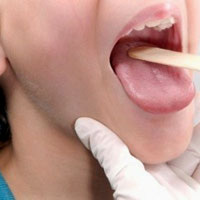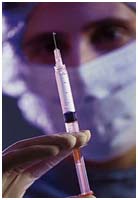Infectious mononucleosis is an acute viral disease that effects mostly young adults and children. Infectious mononucleosis, commonly called “mono”, is caused by the  Epstein-Barr virus (EBV), a member of the herpes group. It has a major impact on athletes as it can produce severe fatigue as well as raise the chance of spleen rupture.
Epstein-Barr virus (EBV), a member of the herpes group. It has a major impact on athletes as it can produce severe fatigue as well as raise the chance of spleen rupture.
Incubation is 4 to 6 weeks. The EBV is carried in the throat and is transmitted to another person via saliva. It has been called the kissing disease. Symptoms and signs: The EBV syndrome usually starts with a 3 to 5-day prodrome of headache, fatigue, loss of appetite, and myalgias. Thereafter, from days 5 to 15 there is fever, swollen lymph glands, and a sore throat. By the end of 2nd week 50 to 70% of those infected with EBV will have an enlarged spleen, 10 to 20% will have jaundice, and 5 to 15% will have a skin rash, a pinkish flush to the cheeks, with puffy eyelids.
Severe complications consist of ruptured spleen, meningitis, encephalitis, hepatitis, and anemia.
Control and treatment: Treatment is supportive and symptomatic. Acetaminophen is often prescribed for headache, fever and malaise.
Athletes may resume easy training after 3 weeks only if the following is adhered to:
- 1. the spleen is no longer enlarged or painful,
- 2. he or she is afebrile, (no longer displaying symptoms of fever),
- 3. liver function tests are normal, and
- 4. pharyngitis as well as any complications have cleared.
Listed below are 8 Upper Respiratory Infections
![]() sinusitis
sinusitis
![]() pharyngitis
pharyngitis
![]() influenza
influenza
![]() hay fever
hay fever
![]() infectious mononucleosis
infectious mononucleosis
![]() acute bronchitis
acute bronchitis
![]() bronchial asthma
bronchial asthma
![]() exercise induced bronchial obstruction (asthma)
exercise induced bronchial obstruction (asthma)


























Speak Your Mind